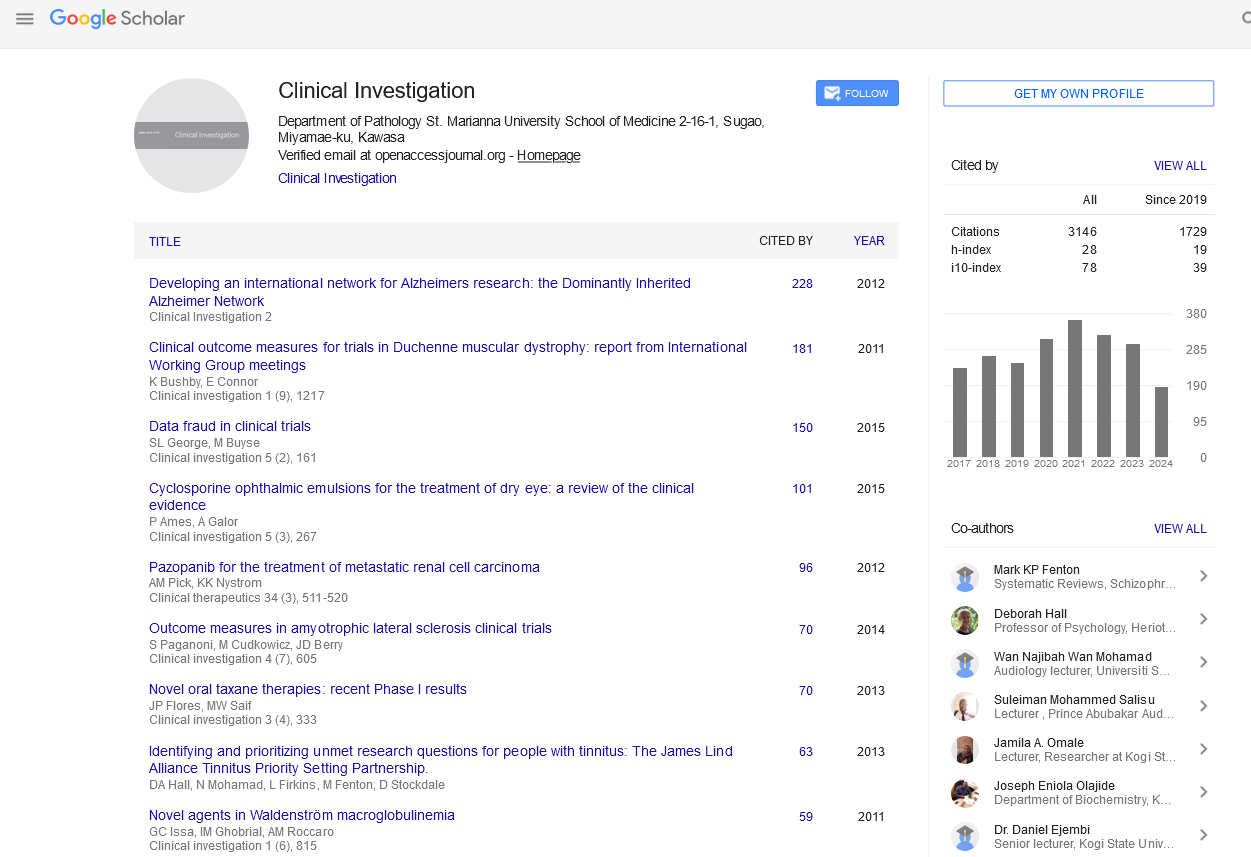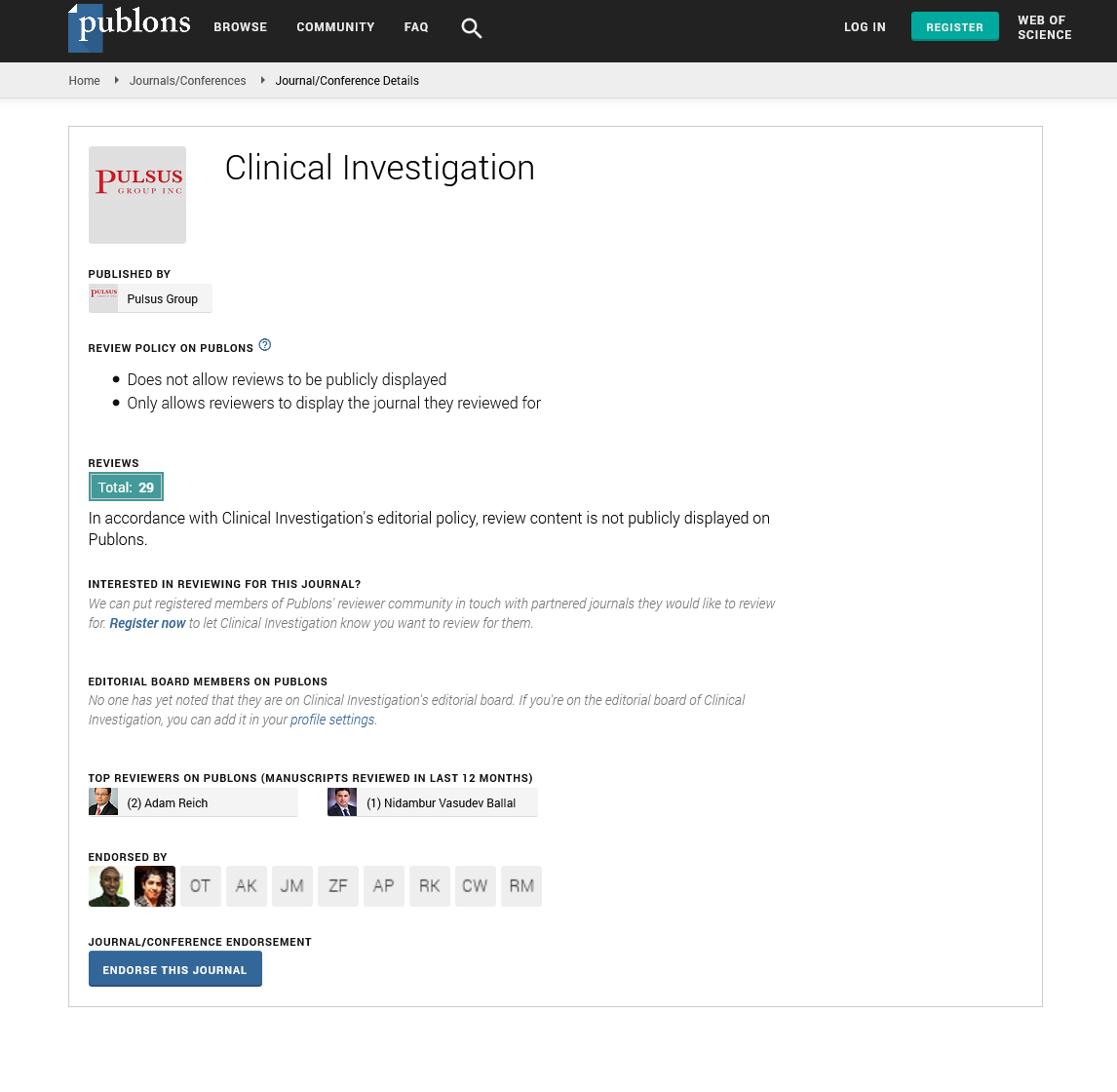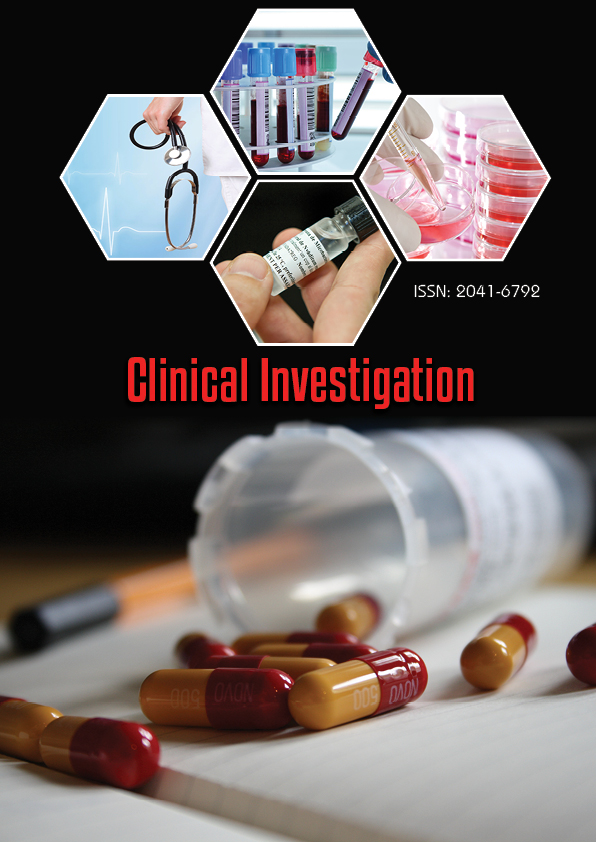Perspective - Clinical Investigation (2024) Volume 14, Issue 2
Oral health: Hygiene
- Corresponding Author:
- Jennifer Keith
Department of Medicine,
University of Arak,
Arak,
Iran
E-mail: keith515@gmail.com
Received: 18-Oct-2023, Manuscript No. FMCI-23-117299; Editor assigned: 20-Oct-2023, PreQC No. FMCI-23-117299 (PQ); Reviewed: 03-Nov-2023, QC No. FMCI-23-117299; Revised: 11-Jul- 2024, Manuscript No. FMCI-23-117299 (R); Published date: 18-Jul-2024, DOI: 10.3752/2041- 6792.2024.14(2).519-520
Abstract
The evaluation of one’s oral health and the adherence to oral hygiene routines are crucial components influenced by various demographic and socioeconomic factors, as well as healthcare service utilization. These factors play a significant role in shaping oral health issues like tooth decay, periodontal disease, and tooth loss, which, in turn, impact an individual’s daily life. The consequences extend beyond functional challenges, encompassing difficulties in chewing and talking, and even social repercussions such as dissatisfaction with appearance, challenges in societal integration, and barriers in employment opportunities.
Keywords
Medical interventions • Exploration • Healthcare • Patient
Introduction
The intricate relationship between general health and oral health cannot be overstated. Optimal oral functionality relies on the well-being of tooth-supporting tissues and the absence of disease in oral cavities. Elements like socioeconomic status, education, and access to medical facilities emerge as pivotal factors influencing oral health due to their intricate interplay with various determinants. Neglecting oral hygiene poses the risk of dental cavities, gingivitis, and eventual tooth loss, necessitating artificial tooth replacement. Unfortunately, a prevalent misconception that tooth loss is an inevitable outcome often discourages individuals from practicing diligent dental hygiene.
Education emerges as a key factor in promoting dental hygiene practices, with higher education correlating with greater responsibility towards oral health. The awareness of the adverse effects stemming from poor dental hygiene is heightened among the well-educated. Dental examinations, aimed at reducing the prevalence of dental issues, hold the potential to alter the natural course of oral disorders. By minimizing tooth loss and enhancing the overall health and quality of life, such examinations become crucial in addressing the social and physical impacts of oral health issues, especially in the context of an aging population.
Description
As life expectancy rises, the future landscape of population health is inevitably linked to oral health. Dental exams not only contribute to improving the natural progression of oral diseases but also serve as educational and reassuring interventions. These effects, coupled with enhanced confidence in oral health, contribute to a more favorable self-evaluation. The subjective perception of oral health is closely tied to the number of carious teeth, with individuals perceiving their oral health as poorer when faced with a higher number of carious teeth. Toothache, predominantly due to caries, further influences individuals’ self-perceived oral health, emphasizing the intimate link between clinical conditions and personal perceptions.
Surprisingly, even with ample knowledge, dental professionals may not consistently practice proper dental health, emphasizing the role of personal behavior shaped by values, life lessons, and experiences. The clinical condition of the dentition, particularly its history of caries experience, significantly impacts self-perceived oral health. Dental care’s primary objective is to preserve a natural dentition throughout life, encompassing both physiological and psychological aspects. Longitudinal research, focusing on diverse demographic groups and socio-economic features, is imperative to gather robust scientific data informing public policies. Recommendations for routine dental checkups, ideally once every two years or more frequently, underscore the importance of preventive care in maintaining both functional dentition and positive self-perceptions of oral health.
In conclusion, the intricate interplay between demographic, socioeconomic factors, and healthcare service utilization significantly influences oral health issues, shaping individual experiences and perceptions. Dental selfevaluation and adherence to oral hygiene routines are pivotal aspects of this complex relationship, with implications reaching beyond functional challenges to impact daily life and social wellbeing. As we reflect on the current state of oral health practices, it is evident that education plays a key role in promoting responsible dental hygiene, with higher education correlating with better awareness and practices.
The link between general health and oral health is undeniable, emphasizing the importance of preventive measures and routine dental examinations. While strides have been made in understanding and addressing oral health issues, challenges persist, including the prevalent misconception that tooth loss is an inevitable outcome. Overcoming such misconceptions and promoting consistent oral hygiene practices remain crucial for the future.
Future directions in this domain should prioritize holistic approaches that integrate oral health into overall health and well-being. Longitudinal research, particularly focusing on diverse demographic groups and socioeconomic factors, is essential for a comprehensive understanding of oral health dynamics. Additionally, interventions should extend beyond clinical settings to incorporate educational programs that target communities, workplaces, and educational institutions.
Public policies should emphasize the integration of oral health into broader health initiatives, recognizing the bidirectional relationship between oral health and general well-being. This includes advocating for routine dental checkups, ideally once every two years, to promote preventive care and maintain both functional dentition and positive self-perceptions of oral health.
Conclusion
As we navigate the future of dental self-evaluation and oral hygiene routines, the emphasis should be on collaborative efforts. Dental professionals, educators, policymakers, and individuals all play crucial roles in shaping a future where oral health is not just an isolated aspect of healthcare but an integral component of overall well-being. By fostering a culture of awareness, education, and preventive care, we can aspire to a future where every individual can confidently evaluate and maintain their oral health, contributing to a society that values and prioritizes comprehensive well-being.


